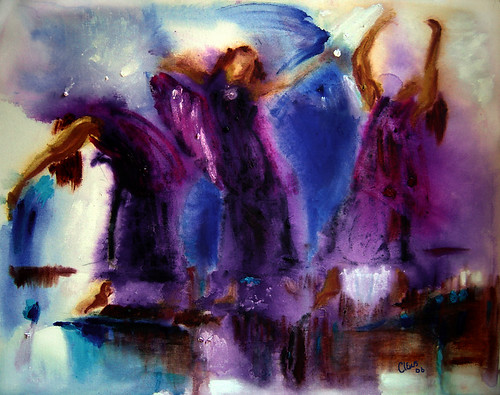 Martin L. Smith maintains that within our hearts there exists a "society of the self." Who can deny this now? The Holy Spirit wants us to reconcile this society under the mercy, grace, and leadership of Christ. During this life-long experience we are guaranteed to witness selves that we were not aware of and hear voices that we had previously silenced. The wounded child in us must be brought to life...and the child of glory can then rejoice in a Spirit of playfulness and wonder.
Martin L. Smith maintains that within our hearts there exists a "society of the self." Who can deny this now? The Holy Spirit wants us to reconcile this society under the mercy, grace, and leadership of Christ. During this life-long experience we are guaranteed to witness selves that we were not aware of and hear voices that we had previously silenced. The wounded child in us must be brought to life...and the child of glory can then rejoice in a Spirit of playfulness and wonder.If the Holy Spirit is reconciling what is in our complicated heart, then how could we ever believe that this could be a boring, lifeless experience. Yet we proceed through life afraid of playfulness and bound in alienated adulthood. Yet, if we allow God to demonstrate his youthfulness...yes, youthfulness...then we can once again be born again by the Creator.
Do you remember the day that you, as a child, once realized that the adult world was filled with awful terror, dishonesty, and unavoidable boredom? I can't place my finger on it but, whether it be the local news or a church dispute, I one day realized that adults were wonderful at screwing up things. Smith writes, "There can be a massacre of the innocents in the heart; there has to be whenever the powers that be there choose the way of greed, senseless hedonism, mediocre agnosticism, or deadly seriousness religion."
And another question. Have you ever been unable to experience the wonderful creation of God...right in front of you...but it just seems to be an impossible task? Maybe this has happened during a vacation where you just can't seem to soak in the awe of what is in front of you. Maybe you have felt disconnected at the sight of a beautiful new-born although you know that you should be amazed at the sight of an innocent, vulnerable child. If you can relate to these experiences in some manner, then there is a good chance that your heart has sold itself out to adulthood and the "authority of the child" has been denied.
"Where the authority of the child (within your heart) is denied there will inevitably be spiritual sickness." Smith rightly proclaims that churches these days do not dare mention that they represent the abundance of life that Jesus came to bring. This is because the abundance of life is simply not there. The impression of life maybe...but true abundant life hardly. We are deadly serious about our worship, there is no time for play, some churches hollow with triviality, most filled with petty relationships, and again all filled with boredom.
So what are we to do? More programs? More fellowships? More obligations? More guilt?
NO!
It begins first with each Christian individual. Each must realize the primacy of imagination and play. Each must let the air out of his/her own adult pomposity (I need to look the word up also). Each must appreciate the surroundings and appreciate the uniqueness of others. Each much have their imaginations rekindled by God. Each must love the child within and permit its power that results in dreaming and feeling.
Creation is wonder and the Creator is glorious. We must allow wonder to penetrate our hearts so that we can enjoy the glory through praise. We must each repent of the sin of familiarity which leads to boredom.
Today, let us all implore the Spirit to open our child's inner eye to see the mystery and beauty and intense significance of the ordinary things of life.
Or as a former professor once told his class, "All you have to do is be awake!" May God awaken the inner child of glory within us.












